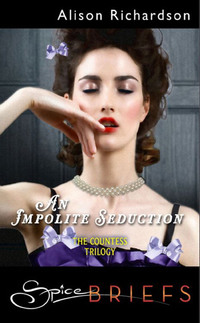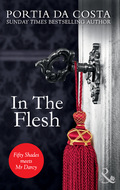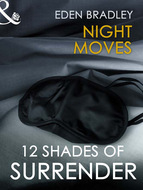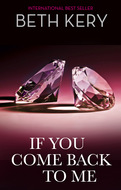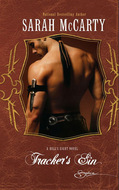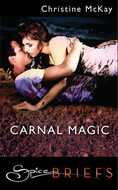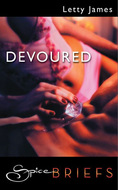This book cannot be downloaded as a file but can be read in our app or online on the website.
Read the book: «An Impolite Seduction»
An Impolite Seduction
Book 2 of The Countess Trilogy
Alison Richardson

MILLS & BOON
Before you start reading, why not sign up?
Thank you for downloading this Mills & Boon book. If you want to hear about exclusive discounts, special offers and competitions, sign up to our email newsletter today!
Or simply visit
Mills & Boon emails are completely free to receive and you can unsubscribe at any time via the link in any email we send you.
There is nothing in the world less appealing than a chaste young man.
Since every enlightened person knows this to be true, I need not explain at any length the dismay I felt when I discovered that my beloved cousin Charlotte was engaged to marry a man who, it was agreed by all who knew him, did not have a single instance of past debauchery to his name. Indeed, Charlotte’s intended reportedly adhered to the highest standards of physical virtue, almost to the point of fanaticism.
In other words, my cousin Charlotte was facing the prospect of a very uninspiring wedding night.
The regrettable personal character of the groom was not the only objectionable feature of the poor girl’s engagement. Charlotte’s parents had died when she was very young. Her guardian, her English maternal uncle, had four daughters of his own, and the man clearly had not wasted much effort on the choice of his ward’s husband. After all, Charlotte was the only daughter of an earl, and to have landed the Viscount of Hudstone for her was no great feat. When I arrived on a chilly April day at the viscount’s middling estate in Derbyshire, I knew at once that my cousin’s future happiness was far from guaranteed.
To make matters worse, Charlotte’s upbringing had been left almost entirely in the hands of men, and as soon as she and I had an opportunity for frank conversation, I saw that her education had been grievously mishandled. She had reached the age of twenty, I was shocked to learn, with her innocence entirely intact, and without the slightest idea how inadvisable it was for a woman to enter the holy state of matrimony as a virgin.
Though society demands we make an outward show to the contrary, nothing is more harmful to a woman’s future well-being than a youth spent in chaste and virginal amusements. All sensible women are aware of this fact. Men are the ones who have spread the pernicious myth that a bride should come to her marriage bed an innocent, though the male sex can perhaps be forgiven for circulating such lies. They are, after all, only looking out for their own interests, in however perverse and unnatural a manner—a virgin bride will not be able to make any invidious comparisons after seeing what her groom has to offer.
Of course, most women of intelligence see through such male deceptions before they reach a marriageable age. That was certainly true of me. Indeed, my own education had been much less restrictive than Charlotte’s, though I had also lost my mother early in life. Nature granted me one great blessing—straight brown hair and small breasts, which, it seems, men understand as the universal mark of a naturally virtuous woman. As a consequence, my father felt no need to police my comings and goings. He was a fond, vague presence in my adolescence; he lovingly and wisely left me to my own devices, a kindness for which I dearly honor his memory. In contrast, my blonde, generously endowed cousin Charlotte was never left alone for a minute. Her guardian had only to look at her golden curls and her curves to sense the danger she presented, and he had watched her like a hawk through every stage of her girlhood.
In short, the situation as I found it upon my arrival in England was deplorable—the bride innocent and inexperienced, ignorant of her true interests, and her groom prudish and less eminent than one would desire. It was clear that the young couple felt no real affection for each other, which meant that Charlotte would have to suffer her betrothed’s shortcomings without the softening influence of romantic attachment. Unfortunately, I came too late to extract her from the promises she had made. All that I could do was to try to find ways to lessen her misery.
Charlotte’s predicament was not the only unpleasant discovery I made upon arriving in Derbyshire, and had I known more about the viscount’s neighbors before coming, I would not have traveled to England at all.
I have had many men in my short life, and in every case but one, I have left them on cordial terms. The one exception, an execrable Scotsman I had known in Paris, was guilty of the basest treachery against me, and after we parted my one consolation was the knowledge that I could likely live out the rest of my life without ever having to set eyes on him again.
This objectionable man, the one I had hoped would fade into the oblivion of a half-forgotten memory, was sprung upon me without warning on my very first night in Derbyshire. I was sitting near the fire waiting for all the viscount’s various guests to assemble for dinner when the butler entered the room and announced, in his soft, soothing voice, “Mr. James McKirnan.”
Taken so much by surprise, I did not react to this introduction as calmly as I would have liked. I jumped up from the divan and exclaimed, “You!” in a loud and aggrieved tone.
In a life that has otherwise been a model of rational comportment, this moment was one of my few concessions to melodrama.
“Countess,” James McKirnan responded with a slight bow. “We’ve all been looking forward to your arrival. Myself most of all.”
I should perhaps say more to explain the violence of my reaction. I first met this man several years ago during a period when, for the purposes of my own entertainment, I had decided to masquerade as a whore in the famous brothel of Madame Barthez. James’s usefulness to me as a steady and serviceable lover was sadly short-lived—through an unfortunate series of accidents, he discovered my real identity, at which point he became impossible to manage. At first, however, he was an ardent and energetic client, and in this capacity his performance was admirable. His physique was not one most aristocratic women would favor, as there was nothing lithe or elegant about his form. He had a very vulgar, strong body, broad through the shoulders, with so many bulging muscles that he was everywhere hard to the touch, but I found him pleasing nonetheless.
In fact, despite the arrogant smile on his face, he looked quite handsome at that very moment, standing before me in the viscount’s drawing room dressed in the sedate evening costume that the English favor for their nighttime meals.
Yet the right suit of clothes does not make a man a gentleman, and I was well aware that James was nothing more than the son of a common tradesman, whatever pretensions he might affect. Men from the lower orders have their uses, of course (and James, to be frank, fucked like a prize-winning Thoroughbred), but they should understand that they serve at our pleasure; they must not try to lead where it is their duty to follow. In our past encounter, James McKirnan had refused to recognize this reasonable principle—he had even suggested, on one occasion when he was surely struck with some momentary madness, that I should come forward publicly as his mistress.
From the confidence of his bearing and the brazenness of his greeting, I could tell that time had not improved him, and I was determined not to let him get the better of me this time.
“Mr. McKirnan has told us that you met often while you were both in Paris,” my cousin Charlotte said innocently, puzzled by my strange reaction to this man’s appearance in the drawing room.
“Yes,” I answered. “We did see each other regularly.” James had come to me once a week at the brothel, every Thursday night.
“Your cousin was always a most welcoming and accommodating hostess,” James said with mock civility. “I always looked forward to our visits with great eagerness.” That was true; he had been very fond of me during the period when he thought me a prostitute.
“Mr. McKirnan is our neighbor,” my unwitting cousin explained, as if she thought the news might please me. “He is renting our cottage for the year and is building a fine new home just north of here, closer to Manchester.”
The family turned away as this point, as if to give two old acquaintances a chance to speak privately.
James sat down next to me on the divan, closer than was polite.
I inched away from him and asked coldly how he had spent the three years since I had seen him last.
His answer was as vulgar as one might expect. “I’ve been making a great deal of money,” he said. “Manchester is a good place for that these days.” He lowered his voice. “You know, I’d be able to pay for much more of your time now, week in and week out.”
He’d been famous at the Paris brothel as a particularly cheap client.
I told him that I was no longer for sale.
“Ah, I see,” he said, speaking very softly to avoid being overheard. “Does that mean you’ll let me fuck you for free now?”
From the mischievous grin on his face, I could tell that he thought himself clever.
I turned away with a sniff and stared into the fire.
“Surely you aren’t still angry with me, Countess,” he said teasingly, as if cajoling a petulant child. “Not after all these years. Aren’t you pleased to see me?”
Luckily I did not have to answer that obnoxious question, because at that moment we were called into dinner.
As we entered the dining room, I saw at a glance that the table was not set at all according to proper precedent. Instead of being next to the host, as was my right as a Countess, I was halfway down the table in an entirely inappropriate place.
I pointed out, reasonably and calmly, that the servant laying out the cards had made a mistake, but the viscount said sternly that the seating order was just as he had wished it, and gave me a look as if I had said something rude.
It is perhaps not necessary to inform the reader that James McKirnan was seated to my right; she will have guessed that already, for such is the logic of fate and of literature.
To my left was an elderly clergyman, the second son of some undistinguished family from the lesser nobility. I pointedly made him the object of my attentions from the moment I sat down, and for the first few courses, James made no further attempts at conversation.
Then, as the meat was being served, he said, “How do you find Derbyshire, Countess?”
Such an innocuous question could not be ignored without awkwardness, and the viscount’s aging mother was waiting expectantly on the other side of the table for my answer.
“It’s very green,” I said vaguely, not having formed any real opinion of the place in the short time since I had arrived. “And peaceful,” I added.
That answer seemed to please the old woman. “Oh, yes, that’s still true, thank heavens. Though all the mines may spoil the place yet,” she said, shooting a nasty glance at James. I assumed from that last statement that his newfound wealth must have had some connection to coal mines.
“I hope you won’t find yourself lacking in diversions here,” the old lady continued, speaking again to me. “Since you are used to a life in town.”
I said politely that I was certain I would find plenty of things in Derbyshire to entertain me.
“We’ll all exert ourselves to make sure you aren’t bored,” James promised casually. As he made this remark, he slipped his left hand into my lap.
My surprise at this bold gesture made me choke on my first bite of cutlet. James leaned toward me in a show of false concern.
“Are you all right, Countess?” he asked.
I nodded and pulled at his arm under the table. He pinched my thigh and slid his hand between my knees.
I could not even risk glaring at him, trapped as I was in the middle of a dinner party for twelve.
The dining room was dimly lit and the tablecloth voluminous, so no one, I am sure, could have noticed the reason for my sudden discomfiture. James had strong hands, and with a few deft strokes of his palm, he had pried my legs apart. As I struggled to keep my face impassive, he slowly and firmly caressed my thighs, talking all the time to the viscount mother’s about the unusually dry spring weather they had had the past week.
The free sample has ended.
